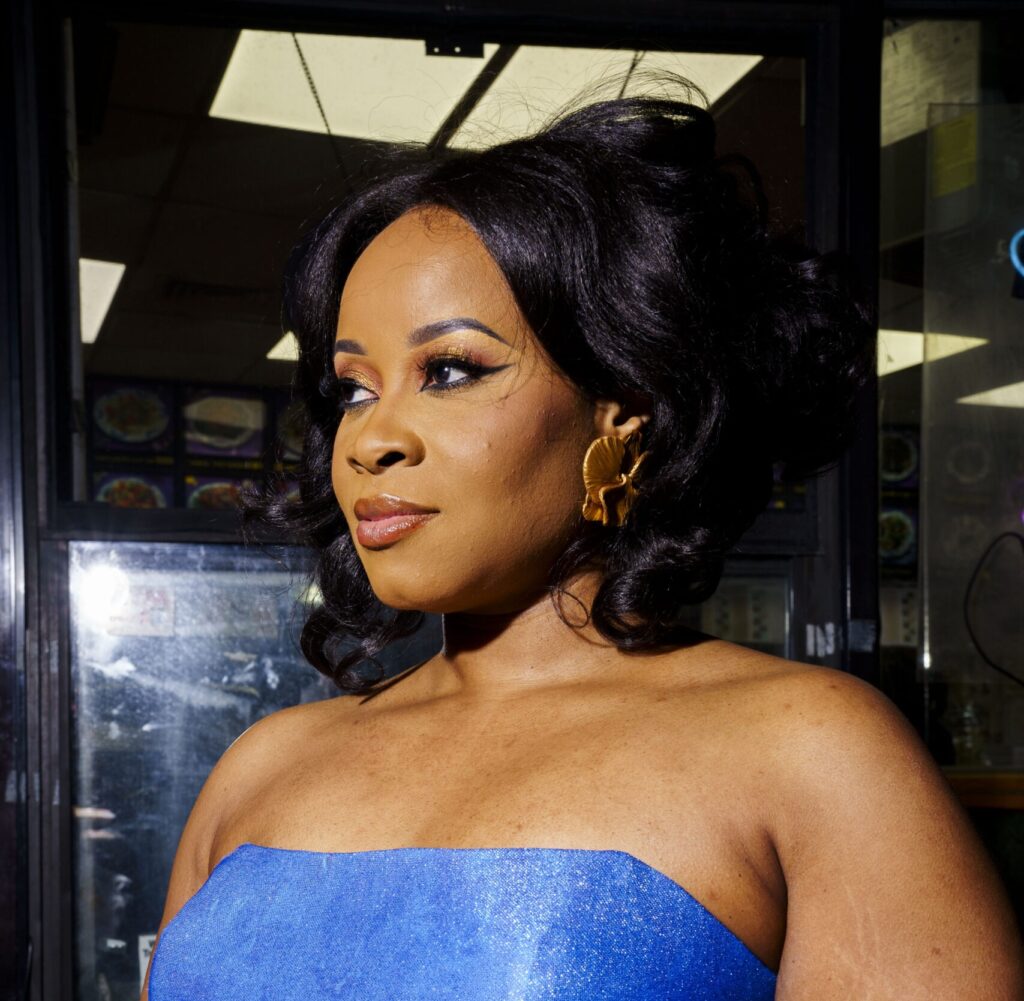

An adventurous deep dive into the story behind the mastermind of Caribbean Tradishon
This Interview appears in the pages of PALMTREE Issue #1: now available for purchase HERE!
3 min
Caribbean Tradishon, as the event is aptly named, offers a feast for the senses. Thanks to the technological wonders of the 21st century, Palmtree was able to virtually experience the food and festivities of “Caribbean Tradishon” for the first time via TikTok and Instagram reels. The event took place at Bleu Nuk in Flatbush, and were immediately hooked because of creators like Mikelah of the Style and Vibes podcast and blog that virtually documented their experience.
Paired with the drink stylings of dea Pierre, Attendees had the opportunity to indulge in a 7-course dinner of mouth-watering dishes representing the diverse culinary world of the diaspora from spicy jerk-incorporated dishes like their jerk mushroom ravioli to decadent desserts, and even Caribbean vegan sushi. In addition to the delectable food offerings, the event also featured captivating cultural showcases that reminded us of Carnival where talented dancers performed vibrant routines in an array of costumes to match. All of this, but who do we thank? Two words: Nneka Nurse.
Nneka is the creator of the “Caribbean Tradishon” series which is presented by her brand “Best Dressed Plate,” a Chef and Restaurant consulting/Management Platform. Having been born in the U.S. and raised in Trinidad as a child, she has always been fascinated by the ability that food has to transcend borders. Growing up in both the States and the Caribbean, her multicultural Caribbean background has allowed her to ground herself in her identity, and with the responsibility of being a first-generation American, has committed herself to preserving and sharing her Caribbean heritage through food and events like this one.
Fortunately, I had the privilege to represent palmtree magazine at Nneka’s 7th installation of “Caribbean Tradishon,” an ‘exclusive dinner event that seamlessly weaves tradition and innovation into a pot of flavors, aromas, and stories.’ The event, kept under wraps until just days before, offered us an exclusive invitation and the opportunity to be among the inaugural guests, adding an extra layer of exclusivity. The theme for this remarkable occasion was “1027” which commemorates the Windrush generation, whose arrival in the UK after World War II marked a pivotal moment in history. “These Caribbean immigrants played a significant role in building the foundations of a new, multicultural Britain,” Nneka eloquently expressed in the invitation, “It’s a time to honor their resilience, culture, and culinary traditions.” The Dinner was a success! Amazing food, amazing people, and an amazing chef so much so that we just knew we had to interview the mastermind behind it all, so we did what anyone with a functioning brain would do and asked Nneka to be a part of PALMTREE’s Debut issue as our first official PALMTREE interview and the rest was history!
Fast forward to a few days before the shoot and a missing stylist, nerves were high but luckily we stumbled upon a very talented wardrobe stylist and MUA named Devonté who put together some beautiful looks for the shoot. The theme was “Glutono Glam” a theme that seamlessly capture Nneka’s essence.
PALMTREE: Can you tell us a bit about yourself and your background? How did you become interested in curating events and promoting Caribbean cuisine?
Nneka Nurse: I’m Nneka Nurse, and my family background is, a Trinidadian father with a Barbadian Grandfather and Great Grandfather, and Jamaican mother. Born in the U.S. and raised in Trinidad as a kid, I’ve always been captivated by the power of food as a universal language. It’s amazing how something as simple as the taste of a dish can connect people in so many ways. As a proud 1st Generation Caribbean roots American, I’m committed to preserving and sharing my Caribbean heritage. Growing up in both Trinidad and America as a child, and visiting family in Jamaica and Barbados have grounded me in my identity. These experiences have fueled my passion for curating events and promoting Caribbean cuisine. My mission is to not only cater to fellow Caribbean descendants but also to introduce the flavors and culture of the Caribbean to those who hold a genuine love for the Caribbean way of life.



PALMTREE: What inspired you to create/host the Caribbean Tradishon event? Was there a particular moment or experience that led to the idea?
NN: Creating Caribbean Tradishon stemmed from my passion for Caribbean cuisine and my belief that it could rival even the most acclaimed “Michelin Star” rated dishes. The inspiration struck me during a disappointing experience at a Caribbean restaurant where the prices were high, yet the menu lacked variety and creativity. I questioned the owner about the possibility of expanding the menu to include a diverse range of dishes commonly found in fine dining establishments. To my surprise, the owner dismissed the idea, claiming they didn’t have access to ingredients or chefs capable of preparing those meals. This encounter fueled my determination to prove them wrong. I started CaribbeanTradishon for the sole purpose of showcasing the richness and complexity of Caribbean-inspired cuisine, challenging stereotypes and celebrating the exquisite flavors of the Caribbean in a way that hadn’t been done before.
PALMTREE: What was your favorite thing about the first Caribbean Tradishon event held in Brooklyn?
NN: Hosting Caribbean Tradishon in Brooklyn for the first time, the epicenter of Caribbean culture, was truly a remarkable experience. What I cherished most about this event was the coming together of talented chefs from the Caribbean diaspora, all sharing a common vision of showcasing the potential of Caribbean cuisine. It was an incredible feeling to witness the chefs infuse their traditional flavors with innovative twists, creating a menu that resonated with the diverse tastes of our guests. The genuine enthusiasm and excitement in the eyes of every guest as they savored each dish confirmed that I was onto something special. This event allowed me to witness the true magic that Caribbean cuisine holds and the unifying power it has to bring people together.
PALMTREE: We loved Caribbean Tradishon in BK and were excited to hear that you’re taking it to Barbados! Could you paint a picture of the event there? What did you hope to convey through the dishes and the overall experience?
NN: Taking Caribbean Tradishon to Barbados was a humbling experience, surpassing all my previous diners. The event took place at Local & Co, a venue perfectly embodying my love for Caribbean culture – from supporting local suppliers to the stunning backdrop of white sands and the ocean waves was a perfect setting, especially during the prestigious Barbados Food & Rum festival.
What made this event special was bringing chefs from various Caribbean islands to Barbados, something that had never been accomplished before. While we are a united Caribbean family, the logistical challenges of domestic travel within the region can be daunting. The event allowed our guests access to Caribbean flavors they might never have had the opportunity to taste otherwise.
I had the pleasure of introducing Chef Alain Lemaire, of Haitian descent, who brought the beloved Griot and Poule Neg Mawon Chicken made with Djon Djon to the table. While these dishes are a Haitian staple, many locals in Barbados may not have experienced it before and they all cleaned their plates! This event wasn’t just about food; it was about breaking barriers, celebrating our shared heritage, and opening hearts and their belly to the diverse flavors of the Caribbean. It was a night of culinary discovery and cultural connection that I will forever cherish.

PALMTREE: What are your plans for the future of Caribbean Tradishon? Can you give us a glimpse into what attendees can expect from upcoming events?
NN: The future of Caribbean Tradishon is exciting! Our goal is to expand beyond intimate dinners and bring the celebration of Caribbean cuisine to a grander scale. While dinners are just the beginning, we envision a future filled with a diverse array of food events, and content that will continue to captivate our audience.
As for upcoming events, guests can expect to continue to get a wide glimpse into the world of Caribbean cuisine, where chefs from around the globe, each with Caribbean roots, will come together to share their interpretations of Caribbean-inspired food. We’re committed to showcasing the diversity and creativity within our culinary heritage, highlighting traditional flavors and contemporary techniques.
PALMTREE: In regards to the second Caribbean tradishon event with the theme being “Freedom” How do you believe food can be a powerful tool for preserving and celebrating Caribbean culture? Were there any specific stories or historical connections highlighted in the Caribbean tradishon event in Barbados?
NN: The Caribbean Tradishon event, themed “Freedom,” was a powerful testament to how food can serve as a tool for preserving and celebrating Caribbean culture. The three islands represented Barbados, Grenada Haiti and Jamaica at the dinner have a rich history of profound struggles for freedom, and today, they stand as culinary beacons of innovation and tradition.
Food, in this context, is the vehicle for storytelling, carrying the weight of these historical struggles and triumphs. Each dish served at the dinner is a vessel for the narratives of resilience and liberation that have shaped Caribbean culture. It’s not merely about the flavors; it’s about the shared heritage, and the evolution of traditions.
During the event, our chefs engaged in intimate conversations with the guests, sharing the stories of the fight for freedom in their respective countries. They wove a narrative of how the dishes they selected played a significant role in their own culinary journeys, providing a direct link between food and cultural heritage. These conversations allowed the guests to connect deeply with the chefs and the rich tapestry of Caribbean culture.
The “Freedom” theme highlighted the connection between food and history, providing a platform for these stories to be retold, celebrated, and passed down to future generations. It’s through these culinary experiences that we honor the legacy of the past while embracing the innovation and traditions that define the spirit of the Caribbean.
PALMTREE: As someone who has been actively promoting Caribbean cuisine, what do you think needs to change in the culinary world’s perception of Caribbean food? How can more recognition be given to the talents of Caribbean chefs?
NN: In the world of Caribbean cuisine, much like in fashion, there are tiers of brands, and it’s time to showcase the full spectrum of our culinary artistry. Undoubtedly, we’ve mastered the art of street food, offering some of the most memorable, flavorful, and widely recreated dishes. However, it’s time to unveil the other facets of our culinary spectrum. We’ve seen global appreciation for classics like Jerk, roti, and doubles, and now it’s time to reveal the depth and sophistication of our culinary landscape.
The shift in perception begins with recognizing that Caribbean chefs are more than just creators of street food; they are educated culinary artists capable of delivering amazing gastronomic experiences. To bring about this change, perhaps we can begin with a shift in the tourist experience. Hotels could play a pivotal role by offering guests a more authentic taste of the local cuisine. This involves not only highlighting street food but also integrating fine dining options that showcase the complexity and innovation within Caribbean culinary traditions. A crucial aspect of this transformation is recognizing and elevating the talents of Caribbean chefs. It’s time to break away from the notion that culinary excellence is solely imported. By hiring local chefs in hotels and paying them equitable wages, we empower a generation of aspiring chefs to believe that success is achievable within their own native lands. This shift not only benefits the chefs but also contributes to a positive culinary ecosystem, creating a sense of pride and respect for Caribbean cuisine on a global scale. It’s an empowerment that starts with embracing the diverse, sophisticated,offerings of Caribbean cuisine. Promote wi tings and watch d ting sell off!
PALMTREE: Finally, what message or impact do you hope to leave on attendees of Caribbean Tradishon events? How do you envision these events contributing to the larger culinary and cultural landscape?
NN: My passion for food and the richness of Caribbean cuisine extends beyond the plate; it’s about unraveling stories, traditions, and cultural nuances that have been guarded through generations. These events are a gateway to the heart of Caribbean culture, a platform to break down barriers and share narratives that have often been held close within the community. It’s a conscious effort to unveil these stories, offering guests not just a culinary journey but a cultural experience.
By featuring the talents of chefs and restaurants that cater to an audience who loves Caribbean culture, I aim to create a lasting impact on the larger culinary landscape. These events are an opportunity to showcase the depth and diversity of Caribbean cuisine, shedding light on the innovation, creativity, and untold stories behind each dish. Ultimately, I want guests to leave not just with a full belly but with a sense of cultural knowledge about the intricacies of Caribbean cuisine and the stories that make it so unique. I want to leave a mark on the culinary and cultural landscape, inviting people to savor, learn, and celebrate the beauty of the Caribbean. My message is to nurture and celebrate our culinary talents within the Caribbean diaspora, that can create a movement that resonates globally, showcasing the world that our cuisine is not just about street food; it’s a rich tapestry of flavors and experiences waiting to be explored at every tier, from the streets to fine dining establishments.
This interview appears in the pages of PALMTREE Issue #1: now available for purchase!
Photographer Patience Ojionuka
MUA Latacia Superville
Stylist Devonte Monerville
Interview PALMTREE






